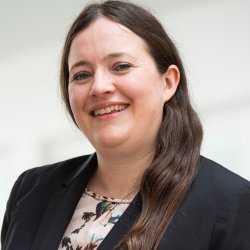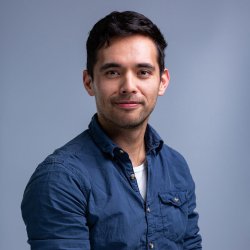Commercialisation Fellow Spotlight - Andrea Darling
This year we thought it would be interesting to hear some early first-hand insights into the IAA Commercialisation Fellowship programme and the relationship between Research and Innovation, directly from the Fellows themselves.
Calling Surrey ECRs!
We are OPEN to receive expressions of interest and applications from ECRs based in all faculties for the new 2022 Cohort! Email your questions, interest, and applications to iaa@surrey.ac.uk.
- Are you one of our Surrey ECRs?
- Are you becoming interested in innovation?
- Are you interested in what the Commercialisation Fellowship can offer you and how it could boost your outputs?
If you said yes to these, then perhaps this is the right opportunity for you. Contact us at iaa@surrey.ac.uk with ANY questions, and apply to our Summer 2022 Cohort (April – September)!
... and now let's hear from Andrea.
Tell us about yourself, why you applied for this fellowship, and what you expect to gain
I am a postdoctoral researcher in the Nutrition, Food and Exercise Sciences Department (School of Biosciences and Medicine, Faculty of Health and Medical Sciences). My innovation focus is to design and produce vitamin D fortified food products that will help increase vitamin D levels in the UK population. One specific focus is to produce products suitable for Black and South Asian ethnic minority groups, who are at high risk of vitamin D deficiency.
The University of Surrey has recently had some wonderful innovation successes (for example in designing dementia technology and the rapid 15-minute COVID-19 test). It gives very good training on writing impact case studies for the REF. However, many academics and researchers, especially early career researchers (ECRs) are still not fully engaged in innovation. Many (like myself) are producing great scientific discoveries, but these are not translated into impact beyond simply influencing policy, etc. I think there could be more training for researchers, especially ECRs.
My Commercialisation Fellowship ambitions are:
- To undergo training to gain a deeper understanding of opportunities in innovation and commercialisation (e.g., how things work in a real-world sense, how things should be done, making the most of existing opportunities).
- To engage with the food industry in designing a UKRI Early Career Fellowship for submission in late 2022. This would be for a fellowship project that designs/produces an effective food product (vitamin D fortified).
How would you define ‘innovation’, how does it fit within an academic environment, and how is it relevant?
I see innovation as the process of producing new products or services which produce benefits to society and/or the environment. Within the academic environment, researchers are in a key position to work with industry partners in driving innovation. They have expert knowledge and skills that are not always present in the industry environment. Knowledge exchange between academia and industry can be a crucial ingredient in producing successful innovation. Innovation is also key in producing income for universities and contributes towards successful impact case studies.
What do you think are the biggest barriers to innovation for researchers at Surrey, in particular within your Dpt or Faculty, and how do you suggest we address these?
I think the biggest barriers across the University are lack of time and awareness.
Lecturers and researchers have large research and teaching commitments. This may make taking on extra projects and innovation activities difficult. I think with the increasing emphasis on innovation this situation is likely to change, with innovation potentially being incorporated more directly into workload planning.
I think there isn’t enough awareness of the need for innovation among academics, including how it can benefit them and the University. I think more campaigns within the University, to show academics why they should think more about innovation and to highlight what help is out there (both within and outside the University), would help.
How has the start of your fellowship begun? Who have you met, what projects are you involved with, and what things have you already learned? – was anything unexpected? Did reality meet your expectations?
The fellowship started well. I joined two projects. One involves working with the Enterprise Programmes team to analyse feedback from Innovate UK grant applications to find out what the common mistakes are. I am currently using this information to write a University of Surrey “Top Tips” booklet to help researchers and businesses be more successful when applying for Innovate UK grants.
The other project involves working with the Tech Transfer Office to contact Food Industry representatives who may be interested in collaborating on the design of a vitamin D fortified food product.
I have already learned a lot about innovation. What was particularly useful was understanding when you need to get a patent (and when you don’t!) as well as the timescale involved in setting up a business and what funding is suitable/available at each stage. It was broadly as I expected it would be, but I have learned more that I thought I would (already!).
If so, how has the fellowship changed your approach to innovation? What are your expectations for the rest of the fellowship e.g. things you’re looking forward to?
Already I have learned that innovation is a long process, and that you need to start thinking early about who could help you, and how to get in contact with them. It takes time to build relationships with people in industry. I have learned a lot about writing Innovate UK bids, particularly how they need to be business focused in terms of how they are written, so they are different from bids for funders (e.g. UKRI).
I am now looking forward to meeting people from industry, nearer the end of the fellowship.
What would you say to a prospective ECR considering applying to the fellowship?
Go for it. You will learn a lot, very quickly. There is the potential for both practical (e.g. practical tips for approaching industry members) and theoretical (e.g. courses on intellectual property) help. The fellowship will be tailored to your own learning needs and is a unique opportunity to work with experts in the innovation field.
Survey
Question | 😱 | 😵💫 | 😐 | 🤓 | 🔥 |
|---|---|---|---|---|---|
Before your Fellowship, what was your practical understanding and application of impact, knowledge exchange and commercialisation activities? |
|
| ✅ |
|
|
Before your Fellowship, what was your understanding of IP? |
| ✅ |
|
|
|
Before your Fellowship, what was your awareness for the relevance of innovation to the academic career? |
| ✅ |
|
|
|
Before your Fellowship, how confident were you to approach industry with a commercial opportunity and to manage that relationship? | ✅ |
|
|
|
|
Before your Fellowship, what was your awareness of the Innovation Strategy teams and their functions? |
| ✅ |
|
|
|
Overall, how do you feel about Innovation now? |
|
|
| ✅ |
|


